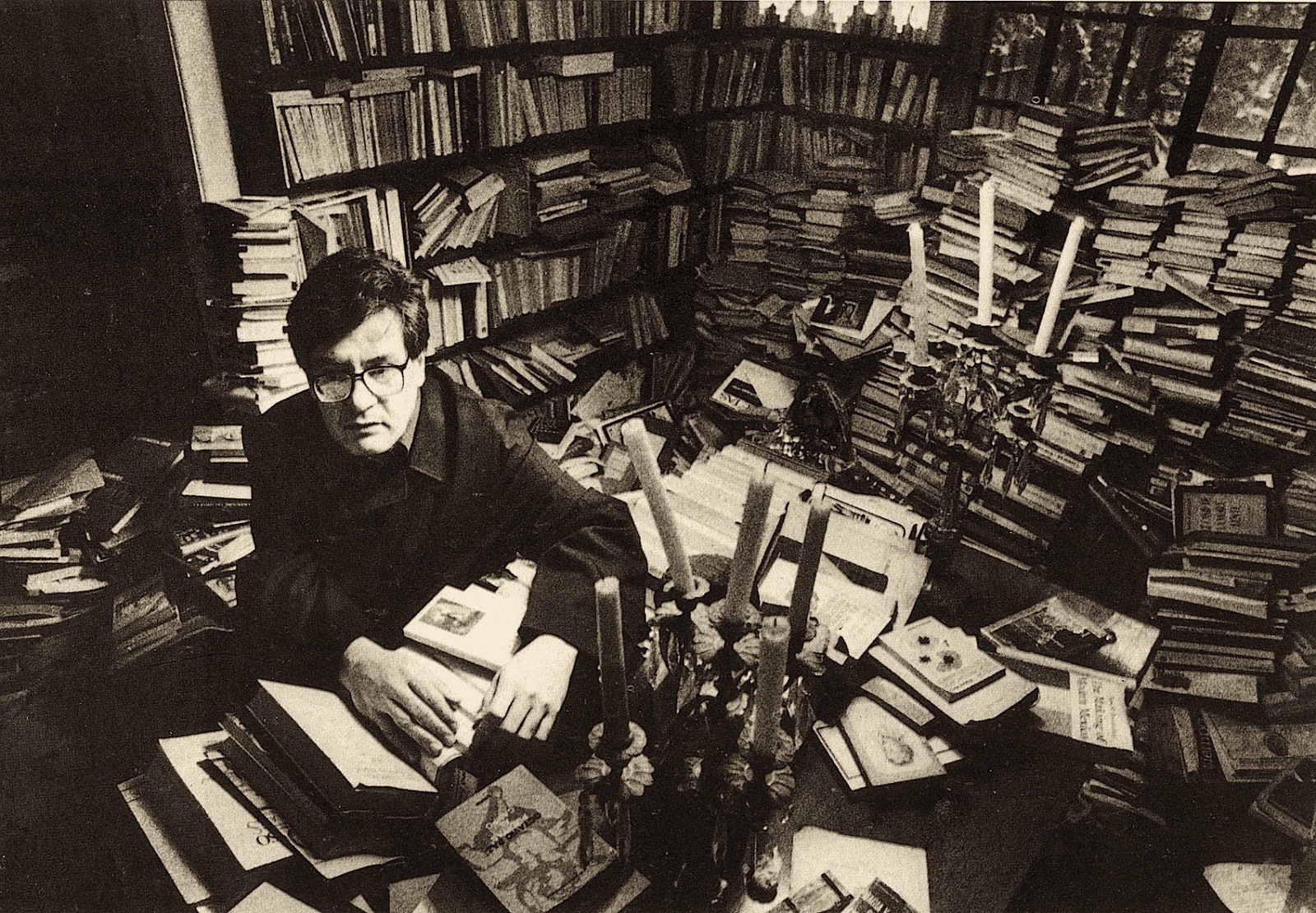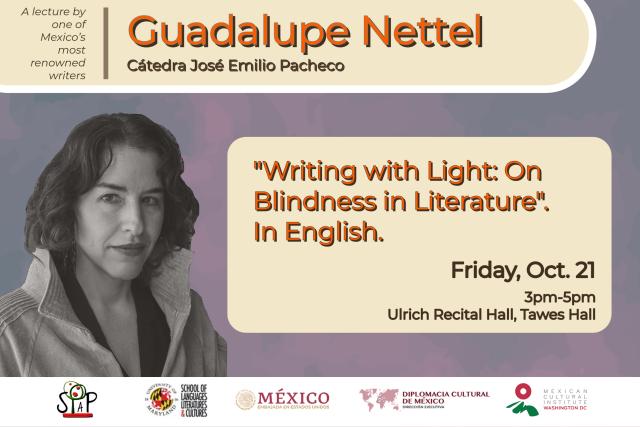José Emilio Pacheco Series
José Emilio Pacheco Distinguished Lectures and Seminars Series
The Department of Spanish and Portuguese (SPAP) at the School of Languages, Literatures, and Cultures (SLLC) of the University of Maryland in College Park, is pleased to announce the creation of the José Emilio Pacheco Distinguished Lecture Series / Cátedra José Emilio Pacheco in collaboration with the Mexican Cultural Institute.
The Department of Spanish and Portuguese (SPAP) at the School of Languages, Literatures, and Cultures (SLLC) of the University of Maryland in College Park, is pleased to announce the creation of the José Emilio Pacheco Distinguished Lecture Series / Cátedra José Emilio Pacheco in collaboration with the Mexican Cultural Institute.
The new Cátedra will serve as a forum for exceptionally great writers, thinkers, philosophers, and scholars who articulate their creative work around Mexico and Latin American literary and cultural traditions, and on the aesthetic, ethical, and human values that José Emilio Pacheco championed. Pacheco was a Distinguished University Professor at Maryland from 1984 to 2006, and he taught and trained a long list of prominent Mexican writers and intellectuals and an international cohort of students. Our department’s relationship with Mexican letters was strengthened by the presence of other important writers and specialists, like Professor Emeritus Jorge Aguilar Mora, Villaurrutia Prize 2016, and Professor Emerita Sandra Cypess, who had long research and teaching careers at the University. This Cátedra also honors their contributions.
The Mexican Cultural Institute has been an ideal partner, not only for its receptiveness and generous past collaborations, but also for the effective models of Cultural Diplomacy that it has systematically fostered in the Greater Washington Area. We are delighted that this collaboration has become a reality.
2022
Guadalupe Nettel: Public Lecture "Writing with Light: On Blindness in Literature"
Guadalupe Nettel (Mexico City, 1973) is a novelist, short story writer, and essayist. She also holds a doctorate in the Language Sciences from the École de Hautes Études en Sciences Sociales in Paris. With subtlety, tenderness, ingenious narrative structures and a good dose of humor, her texts address an impressive variety of topics, including adolescence and self-understanding, historical trauma and the writing of Julio Cortázar and Octavio Paz. Her book After the Winter (2014), about mourning and affection, won the Herralde Novel Prize. She is the director of the Revista de la Universidad de México, and she has written for The New York Times en Español and El País. Her work has been translated into more than 15 languages, and this includes her recent novel Still Born (2020).
2021
Mario Bellatin: Conferencia: Mis nuevas escrituras- Las nuevas escrituras
From the New Yorker, By Graciela Mochkofsky, December 23, 2015:
"Bellatin, who was born in Mexico in 1960, grew up in Peru, his parents’ homeland, and it was there that he began his career, by self-publishing a novel, “Mujeres de Sal” (“Salt Women”), in 1986. In 1995, he returned to Mexico City, where he still lives, sharing an apartment with four dogs in a building not far from the Zócalo, Mexico City’s main square. He has published more than thirty books, many of which have been translated into more than a dozen languages. (Six have appeared in English.) Bellatin is usually included in a group of post-boom Latin American writers, such as the Chilean Roberto Bolaño and the Argentine César Aira, who have introduced innovations not only in the style of their prose but in the way they think about literature."
"In Bellatin’s stories, the line between reality and fiction is blurry; the author himself frequently appears as a character. His books are fragmentary, their atmospheres bizarre, even disturbing. They are full of mutations, fluid sexual identities, mysterious diseases, deformities."
2020
2019
Margo Glantz: Seminar: La conquista de la escritura
Margo Glantz, narrator and Mexican essayist, born in Mexico D.F. in 1930. Is best known for her 1987 autobiography Las genealogías, a volume of memoirs where he/she follows the footsteps of his parents, Ukrainian Jews, from Europe to America. She also wrote fiction and nonfiction that shed new light on the seventeenth-century nun Sor Juana Inés de la Cruz. Among her many honors, she won the Magda Donato Prize for Las genealogías and received a Rockefeller Grant (1996) and a Guggenheim Fellowship (1998).
2018
Cristina Rivera Garza: Public Lecture: José Emilio Pacheco our great Disappropiationist
Cristina Rivera Garza, is the award-winning author of six novels, three collections of short stories, five collections of poetry and three non-fiction books. Originally written in Spanish, these works have been translated into multiple languages, including English, French, Italian, Portuguese, and Korean. The recipient of the Roger Caillois Award for Latin American Literature (Paris, 2013); as well as the Anna Seghers (Berlin, 2005), she is the only author who has won the International Sor Juana Inés de la Cruz Prize twice, in 2001 for her novel Nadie me verá llorar (translated into English by Andrew Hurley as No One Will See Me Cry ) and again in 2009 for her novel La muerte me da. She has translated, from English into Spanish, Notes on Conceptualisms by Vanessa Place and Robet Fitterman; and, from Spanish into English, "Nine Mexican Poets edited by Cristina Rivera Garza," in New American Writing 31. She was the Breeden Eminent Scholar at Auburn University in Fall 2015 and a fellow at the UCSD Center for Humanities 2015-2016. She received a Senate Grant from UCSD and the prestigious three-year Sistema Nacional de Creadores grant from Mexico.
2017
Elena Poniatwoska: Seminar: Retratos de mujer
Elena Poniatwoska is a French-born Mexican journalist and author, specializing in works on social and political issues focused on those considered to be disenfranchised especially women and the poor. She was born in Paris to upper-class parents, including her mother whose family fled Mexico during the Mexican Revolution. She left France for Mexico when she was ten to escape the Second World War. When she was eighteen and without a university education, she began writing for the newspaper Excélsior, doing interviews and society columns. Despite the lack of opportunity for women from the 1950s to the 1970s, she wrote about social and political issues in newspapers, books in both fiction and nonfiction form. Her best known work is La noche de Tlatelolco (The night of Tlatelolco, the English translation was entitled "Massacre in Mexico") about the repression of the 1968 student protests in Mexico City. Due to her left wing views, she has been nicknamed "the Red Princess". She is considered to be "Mexico's grande dame of letters" and is still an active writer.
2016
Juan Villoro: Seminar: Narrativas de ficción y no ficción en el contexto de la violencia actual
Juan Villoro (born 24 September 1956, in Mexico City) is a Mexican writer and journalist and the son of philosopher Luis Villoro. He has been well known among intellectual circles in Mexico, Latin America and Spain for years, but his success among a wider readership has grown since receiving the Herralde Prize for his novel El testigo.




